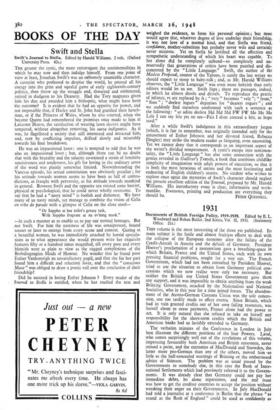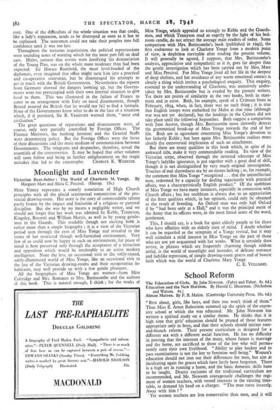1931
Tins volume is the most interesting of the three yet published. Its main subject is the futile and almost fruitless efforts to deal with the collapse of the European economy after the failure of the Credit-Anstalt in Austria and the default of Germany. President Hoover's proclamation of a moratorium gave a breathing-space in which Britain France and the United States, each with its own
pressing financial problems, sought for a way out. The French Government, which had not been consulted by President Hoover, tried to use the situation to obtain from Germany political con- cessions which we now realise were only too necessary. But neither the British nor United States Government gave them any support, and it was impossible to obtain anything from the weak Bruning Government, attacked by the Nationalists and National Socialists' who in this year for a time joined forces. The abandon- ment of the Austro-German Customs Union was the sole conces- sion, one too tardily made to affect events. Since Britain, which had in vain granted credits out of her own failing resources, was herself about to cease payments, France alone had the power to act. It is only natural that she refused to take on herself any responsibility for the short-term credits which the British and American banks had so lavishly extended to Germany.
The verbatim minutes of the Conference in London in July best illustrate the different positions of the four Powers. Laval, who comes surprisingly well out of the revelations of this volume, impressing favourably both American and British statesmen never missed a point, and the entreaties of MacDonald and -Snowden, the latter more pro-German than any of the others, moved him 'as little as the half-concealed warnings of Bruning or the embarrassed advice of Stimson. The problem was as usual passed by the Governments to somebody else, in this case the Bank of Inter- national Settlements which had previously referred it to the Govern- ments. It was already clear that Germany could not pay her immediate debts, let alone reparations, and the real issue was how to get the creditor countries to accept the position without wreaking their anger on their Governments. In July MacDonald had told a journalist at a conference in Berlin that the phrase "as sound. as the Bank of England" could be used as confidently as
ever. One of the difficulties of the whole situation was that credit, like a lady's reputation, tends to be destroyed as soon as it has to be explained. The statesmen could not take their peoples into full confidence until it was too late.
Throughout the tortuous negotiations the political repercussions were sounding notes of warning which for the most part fell on deaf ears. Hitler, content that events were justifying his denunciation of the Young Plan, was on the whole more moderate than had been expected. Sir Horace Rumbold, the most level-headed of the diplomats, even imagined that office might turn him into a practical and co-operative statesman, but he discouraged his attempts to get in touch with the British Government. Nevertheless the reports from Germany showed the dangers looming up, but the Govern- ments were too preoccupied with their own internal situation to give heed to them. This was illustrated in the failure of France to come to an arrangement with Italy on naval disarmament, though Briand assured the British that he would not fail to find a formula. None of the Governments knew what to do in the face of a situation which, if it persisted, Sir R. Vansittart warned them, "must end civilisation."
The great questions of reparations and disarmament were, of course, only very partially controlled by Foreign Offices. The Finance Ministers, the banking interests and the General Staffs were determining policy. But the Foreign Offices were the focus of their discussions and the main medium of communication between Governments. The telegrams and despatches, therefore, reveal the essentials of the controversies. It may be hoped that other volumes will soon follow and bring us further enlightenment on the tragic mistakes that led to the catastrophe. CHARLES K. WEBSTER.



































 Previous page
Previous page